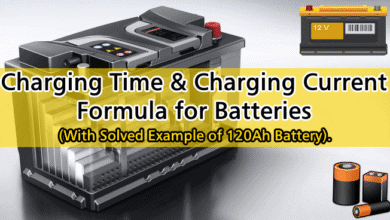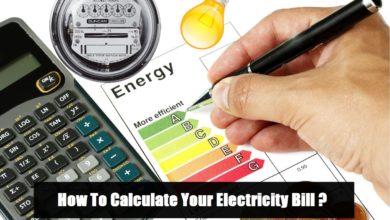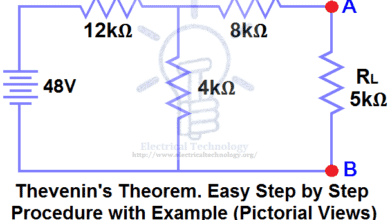Basic Concepts (MCQs With Explanatory Answers)
Basic Concepts (Electrical Fundamentals) MCQs With Explanatory Answers
1. What is The Basic Three Electrical Quantities.
- Resistance, Capacitance, Inductance
- Power, Voltage, Conductance
- Voltage, Current, Resistance(Impedance)
- Current , Reluctance, Inductance
Explanation: The reader may select option 1, but do not forget that there is no concept of Option 1 ( Resistance, Capacitance , inductance ) without Option 3 ( Voltage, Current, Power ) Hence The basic Electrical Quantities are Voltage, Current and Power ( Option 3).
Show Explanatory Answer
2. In case of Short Circuit,_______Current will flow in the Circuit.
- Zero.
- Very Low
- Normal.
- Infinite
Explanation: At the short circuited point, the voltage difference is very low (about Zero) So then put the value in → I = P/V …. so if we put V = 0, Then Current will be infinite.
Show Explanatory Answer
3. Ω (Ohm) is the Unit of ___________?
- Resistance (R)
- Inductive Reactance ( XL)
- Capacitive Reactance (Xc)
- All of the above
- None of the above
Explanation: As we better know that Inductive and Capacitive reactances are resistances, so the unit of all these quantities should be same i.e Ohm (Ω)
Show Explanatory Answer
4. Siemens or Mho (℧) is the unit of ____________?
- Conductance
- Admittance
- Both 1 & 2
- None of the above
Explanation: Conductance (G) is the inverse/reciprocal of Resistance (R) and the SI unit of Conductance (G) is Siemens (S) or Mho (℧) and Admittance (Y) is the inverse/reciprocal of Impedance(Z). but we also know that impedance(Z) is resistance in AC Circuits. So both of (R) and (Z) are Resistances. Therefore the reciprocal/inverse of R and Z = G and Y respectively. And G and Y are same. So the SI unit of these Quantities ( G and Y ) = Siemens (S) or (or Mho (℧).
Show Explanatory Answer
5. What quantity of charge must be delivered by a battery with a Potential Difference of 110 V to do 660J of Work?
- 0.6 C
- 6 C
- 60 C
- 600 C
Explanation: Q = W / V = 660J / 110V = 6C
Show Explanatory Answer
6. The quantity of a charge that will be transferred by a current flow of 10 A over 1 hour period is_________ ?
- 10 C
- 3.6 x 104 C
- 2.4 x 103 C
- 1.6 x 102 C
Explanation: Q = I x t = 10A x ( 60 x 60 Sec) = 3.6 x 104 C
Show Explanatory Answer
7. If a 100Watts Bulbs ON for 10 hours, then what will be the amount of consumed Electricity?
- 100Watts
- 100Watts per Hour
- 1000 Watts ( 1kW)
- 1kWh = 1 Unit of electricity
Explanation: The Basic Unit for Consumed Electricity is kWh = one unit (also Called Board of Trade Unit =BTU). Now, 10 hours x 100 Watts = 1kWh. (1kW = 1000Watts.
Show Explanatory Answer







why ac ratings are in tons?
its all about BTU i.e british thermal units BTU: energy required to raise the temp of room by a degree 1 ton=12000 BTU/hr
because initially people use ice to decrease the temperature and ice required in tons that’s why 1 ton ac cooling power equal to 1 ton of ice cooling power
misplaced answer on question 3
Thanks 4 correction
Helpful common electrical knowledge. Thanks……..
it's very helpful for my interview.please send more questions<br />
please send us more questions thank you
Assalamu alikum wasim bhai…u r doing very good job..i learn a lot from ur site..i cant do only one thing for u..that is dua..i ask allah to show his mercy always on u in both d worlds.ameen summa ameen<br />
Thanks for the best wishes… And same to you…
please send us more questions thank you.
I like
plz send me more question?
Thank you very much
Thank You.
The Basic Unit for Consumed Electricity is kWh = one unit (also Called Board of Trade Unit =BTU).
Now, 10 hours x 100 Hours = 1kWh. Watts = 1000Watts.
how to get 100 hours???
Thanks For correction… It was 10 Hours x 100Watss = 1000Wh = 1kW.
Give more questions
Plz open in answer
Hi Amit… Just Click on “Expand Explanatory Answer”.
le me know if you want to know more. Thanks